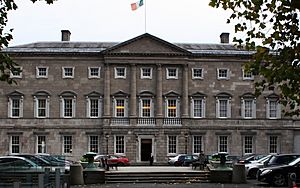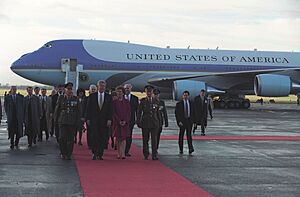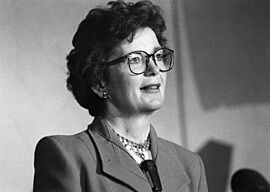Mary Robinson facts for kids
Quick facts for kids
Mary Robinson
|
|
|---|---|
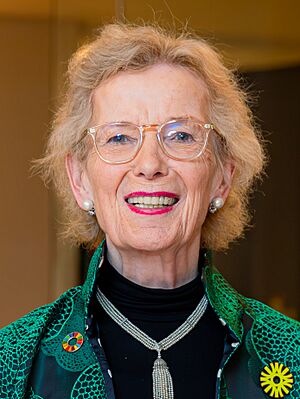
Robinson in 2024
|
|
| President of Ireland | |
| In office 3 December 1990 – 12 September 1997 |
|
| Taoiseach | |
| Preceded by | Patrick Hillery |
| Succeeded by | Mary McAleese |
| United Nations High Commissioner for Human Rights | |
| In office 12 September 1997 – 12 September 2002 |
|
| Secretary-General | Kofi Annan |
| Preceded by | José Ayala Lasso |
| Succeeded by | Sérgio Vieira de Mello |
| Senator | |
| In office 5 November 1969 – 5 July 1989 |
|
| Constituency | Dublin University |
| Personal details | |
| Born |
Mary Therese Winifred Bourke
21 May 1944 Ballina, County Mayo, Ireland |
| Political party | Independent (before 1977, 1985–present) |
| Other political affiliations |
Labour Party (1977–1985) |
| Spouse |
Nicholas Robinson
(m. 1970) |
| Children | 3 |
| Residences | |
| Alma mater | |
| Profession |
|
| Awards |
|
| Signature | |
Mary Therese Winifred Robinson (born Mary Bourke on May 21, 1944) is an important Irish leader who became the first female President of Ireland. She served as president from 1990 to 1997. Before becoming president, she was a senator for 20 years.
Robinson was the first president who was an independent candidate, meaning she didn't have the support of Ireland's largest political party, Fianna Fáil. After her presidency, she worked for the United Nations as the High Commissioner for Human Rights from 1997 to 2002.
As High Commissioner, she was the first person in that role to visit Tibet. She also spoke out against the death penalty in the United States. After leaving the UN, she started groups to promote human rights and climate justice.
Many people believe Robinson changed Ireland for the better. As a lawyer and senator, she helped change laws to give people more personal freedoms. She was a very popular president, with some polls showing that over 90% of Irish people approved of her work.
Contents
Early Life and Education
Mary Bourke was born in Ballina, County Mayo, in 1944. Both of her parents were doctors. Her family had a long and interesting history in Ireland, with relatives involved in different political movements.
She went to school in Dublin and later studied law at Trinity College Dublin. At the time, it was unusual for Catholics to attend Trinity, so her parents had to get special permission. She was one of only three women in her law class.
In 1967, she gave a speech calling for big changes in Irish law. She wanted to make life fairer for everyone. After graduating, she studied at Harvard Law School in the United States.
Law Career and Time as a Senator
At just 25 years old, Mary became a law professor at Trinity College in 1969. That same year, she was elected to the Irish senate, called the Seanad Éireann. As a senator, she worked hard to update Ireland's laws. She wanted to make sure women had the same rights as men, such as being able to serve on juries.
In 1970, she married Nicholas Robinson, and they have three children.
During her time as a senator, Robinson was involved in several important court cases. She fought for equal rights for women and challenged unfair tax laws. She served in the senate for 20 years before deciding not to run for re-election in 1989.
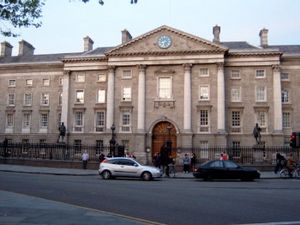
Robinson was a law professor and a senator for the university for twenty years.
Becoming President of Ireland
The 1990 Election
Robinson decided to run for president in 1990. She was the first woman to be nominated for the job. Her main opponents were Brian Lenihan from the Fianna Fáil party and Austin Currie from the Fine Gael party.
At first, most people thought Brian Lenihan would win easily. But as the campaign went on, Robinson became very popular. She had a fresh message about creating a more modern and inclusive Ireland.
A major moment in the campaign happened when a scandal hurt Lenihan's reputation. A government minister also made a personal attack on Robinson, which backfired and made many people, especially women, decide to vote for her instead.
On election day, Lenihan had the most votes in the first round. However, he did not have enough to win outright. When the second-choice votes from the other candidate were counted, most of them went to Robinson. She won the election and made history.
A New Kind of President
Robinson became the seventh President of Ireland on December 3, 1990. She changed the presidency in many ways. She wanted to be a president for all the people of Ireland, including those who felt left out.
One of her famous symbols was placing a light in the window of her official home, Áras an Uachtaráin. The light was a symbol of welcome for all the Irish people who had moved to other countries.
She was an incredibly popular president. At one point, her approval rating reached 93%, the highest ever for an Irish president.
A President on the World Stage
Building Bridges
Robinson worked to improve relationships between Ireland, Northern Ireland, and Great Britain. In 1993, she became the first serving Irish president to visit the United Kingdom and meet Queen Elizabeth II at Buckingham Palace.
She also met with leaders from all different communities in Northern Ireland, including Gerry Adams, the president of Sinn Féin. This was controversial at the time, but Robinson believed it was important to talk to everyone to help build peace.
Global Human Rights
Robinson used her position to draw attention to problems around the world. In 1992, she traveled to Somalia, which was suffering from a terrible famine. Her visit helped bring global attention to the crisis.
She also had a good relationship with the Catholic Church. She visited Irish priests and nuns working abroad and met with Pope John Paul II in Rome.
Robinson resigned as president a few months early, on September 12, 1997. She left to take on a new role as the United Nations High Commissioner for Human Rights.
United Nations High Commissioner
As the UN High Commissioner for Human Rights, Robinson's job was to be a global voice for people's rights. She was the first person in this role to visit Tibet in 1998. She also spoke out against the use of the death penalty in the United States.
In 2001, she oversaw the World Conference against Racism in Durban, South Africa. The conference was difficult and faced criticism, but she stayed on for an extra year to lead it. Her time as High Commissioner ended in 2002.
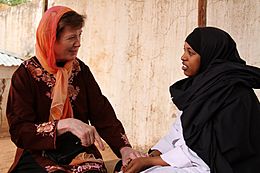
Life After the United Nations
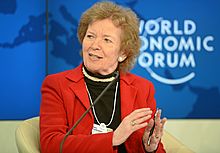
After leaving the UN, Robinson continued her work on global issues. She started The Mary Robinson Foundation – Climate Justice, which focuses on how climate change affects poor communities.
She also became a founding member of "The Elders," a group of world leaders started by Nelson Mandela. The Elders use their experience to help solve some of the world's biggest problems, like conflict and poverty. In 2018, she became the Chair of The Elders.
Robinson has also spoken about the need to fight climate change in our daily lives. She has encouraged people to eat less meat because of the impact meat production has on the environment.
Awards and Recognition
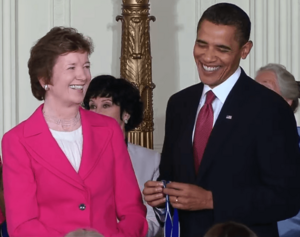
Mary Robinson has received many awards for her work. In 2009, U.S. President Barack Obama awarded her the Presidential Medal of Freedom. This is the highest honor a civilian can receive in the United States.
President Obama praised her as a "crusader for women and those without a voice." She has also received dozens of honorary degrees from universities all over the world. Her work continues to inspire people to fight for a fairer and more just world.
Images for kids
-
Robinson and Musimbi Kanyoro with a cheetah
-
Mary Robinson, the UN Special Envoy for the Great Lakes region, on 28 April 2013 in Kinshasa, during a press briefing at the Ministry of Foreign Affairs
See also
 In Spanish: Mary Robinson para niños
In Spanish: Mary Robinson para niños


